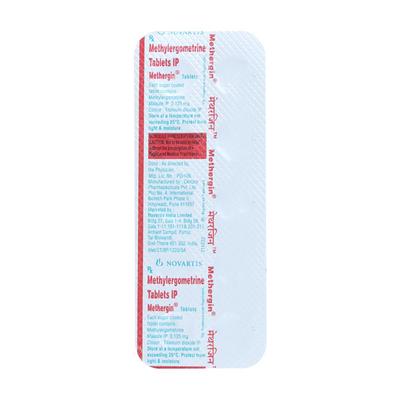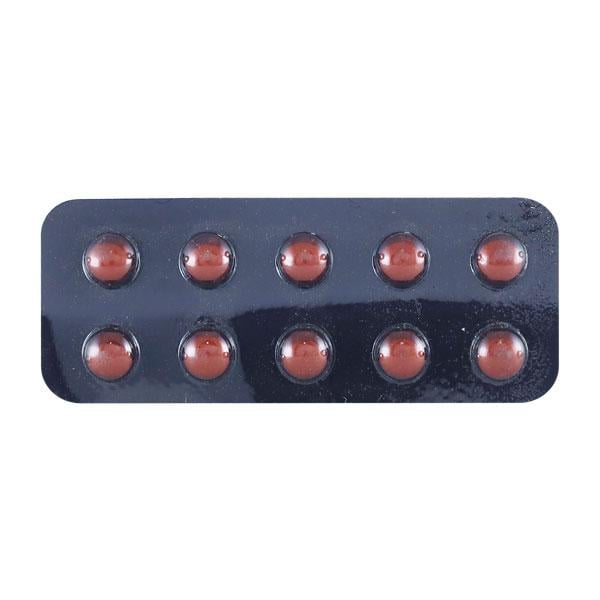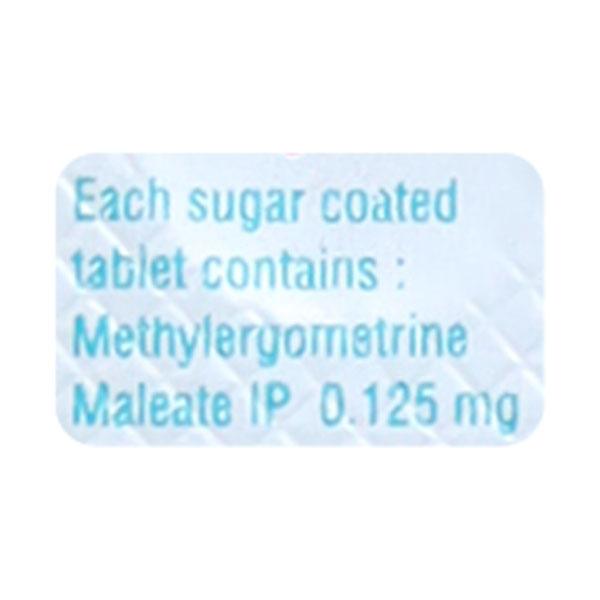

Netmeds First Membership
Quick Links
Introduction About METHERGIN TABLET
METHERGIN TABLET contains Methylergometrine which belongs to a group of medicines called Ergot alkaloids. METHERGIN TABLET is used in the routine management of uterine atony (inability of the uterus to contract sufficiently during and after childbirth), haemorrhage and subinvolution of the uterus (delayed return of enlarged uterus to normal size) following delivery of placenta.
METHERGIN TABLET is also used to control uterine haemorrhage (heavy/unusual bleeding from uterus) following delivery of anterior shoulder of the foetus (childbirth).
METHERGIN TABLET is not recommended for use in patients allergic to Methylergometrine. It is also not recommended for use in patients with high blood pressure, and/or toxemia (blood poisoning due to local bacterial infection).
Before taking METHERGIN TABLET, inform your doctor if you are a smoker, and/or have high cholesterol, obesity, diabetes, heart problems (such as coronary artery disease), kidney problems (such as impaired renal function), and/or liver problems (such as impaired hepatic function).
METHERGIN TABLET is generally not recommended for use during pregnancy and in breast feeding women. The medicine should be taken with caution in elderly women (aged above 65 years) after consulting the doctor.
The most common side effect of taking METHERGIN TABLET is hypertension associated with seizure, and/or headache. Consult your doctor if the side effect worsens.
Uses Of METHERGIN TABLET
- Helps in the routine management of uterine atony, haemorrhage and subinvolution of the uterus following delivery of placenta
- Helps to control uterine haemorrhage following delivery of anterior shoulder of the foetus (childbirth)
How METHERGIN TABLET Works
METHERGIN TABLET works by causing sustained contractions of uterine smooth muscles by acting directly on the uterine smooth muscle which leads to compression of blood vessels resulting in controlled/reduced blood loss following childbirth.
How to use METHERGIN TABLET
Take METHERGIN TABLET as advised by your physician. Swallow the medicine with a glass of water. Do not crush or chew the medicine. Your doctor will decide the correct dose and duration for you depending upon your age, body weight and disease condition.
Side Effects Of METHERGIN TABLET
Common
- hypertension associated with seizure, and/or headache
Rare
- chest pain, fast/rapid/slow heart rate, coronary arterial spasm (sudden tightening of arteries of heart), heart attack
- vasoconstriction, vasospasm (narrowing of brain blood vessel)
- shortness of breath
- hematuria (blood in urine)
- thrombophlebitis (inflammation of a vein)
- hallucinations, dizziness
- leg cramps, ringing in ears, nasal congestion
- diarrhoea
- diaphoresis (sweating at a usual degree)
- rash
- foul taste
- signs of anaphylaxis reaction (life threatening allergic reaction) such as red itchy welts, low blood pressure, wheezing, and/or trouble in breathing
How To Manage Side Effects
Diarrhoea:
Drink plenty of water and stay hydrated. Try to avoid taking any medicine on your own to manage diarrhea. Consult and inform your doctor if the symptom worsens.
Rash:
Do not scratch the affected area. Wear protective clothing while going outdoors. Regularly moisturize your skin. Consult and inform your doctor if the symptom gets worse.
Dizziness:
Try to rest and get enough sleep. Try to avoid driving or operating any tools or machines while you feel dizzy. Limit consumption of alcohol, as it can aggravate dizziness. Consult and inform your doctor if the symptom worsens.
Warning & Precautions
Pregnancy
METHERGIN TABLET is generally not recommended for use during pregnancy. Consult your doctor before taking METHERGIN TABLET.
Breastfeeding
METHERGIN TABLET is generally not recommended for use in breast feeding women since the medicine may pass through breast milk. Consult your doctor before taking METHERGIN TABLET.
Kidney
METHERGIN TABLET should be used with caution in patients with kidney problems such as impaired renal function. Consult your doctor before taking the medicine.
Liver
METHERGIN TABLET should be used with caution in patients with liver problems such as impaired hepatic function. Consult your doctor before taking the medicine.
Allergy
Do not take METHERGIN TABLET if you are allergic to Methylergometrine, and/or any other ingredients of this medicine.
Heart Disease
METHERGIN TABLET should be used with caution in patients with heart problems such as coronary artery disease. Consult your doctor before taking the medicine.
Others
METHERGIN TABLET is not recommended for use if you:
- have high blood pressure
- suffer from toxemia (blood poisoning due to local bacterial infection)
Before taking METHERGIN TABLET, inform your doctor if you:
- are a smoker
- suffer from high cholesterol, obesity, diabetes
- have obliterative vascular disease (gradual narrowing of arterial blood vessel), and/or suffer from sepsis (life threatening complication of an infection)
- are in second stage of labor
Use in Geriatrics:
METHERGIN TABLET should be used with caution in elderly patients (aged 65 years and above). Consult your doctor before taking the medicine.
Interactions
A. Drug-Drug interactions:
Before taking METHERGIN TABLET, inform your doctor if you are taking any of the following medicine:
- macrolide antibiotics (medicines used to manage bacterial infections) such as erythromycin, troleandomycin, clarithromycin
- HIV protease/reverse transcriptase inhibitors (medicines used to manage HIV) Ex. atazanavir, cobicistat, darunavir, delavirdine, fosamprenavir, indinavir, nelfinavir, ritonavir, saquinavir, nevirapine
- nefazodone, fluoxetine, fluvoxamine (medicines used to manage depression)
- fluconazole, itraconazole, ketoconazole, posaconazole, voriconazole, clotrimazole (medicines used to manage fungal disease)
- zileuton (used to manage asthma)
- rifampicin (used to manage infections)
- beta-blockers (used to manage high blood pressure) Ex. acebutolol, atenolol
- aesthetics (medicines used for the induction and maintenance of general anaesthesia) Ex. halothan, methoxyfluran
- glyceryl trinitrate (used to manage angina)
- prostaglandins (used to induce labor/abortion and manage postpartum haemorrhage)
B. Drug-Food interaction:
Grapefruit/or its juice may interact with this medicine and lead to unwanted side effects. Consult your doctor before taking any grapefruit products.
Overdosage:
If you or anyone else accidentally take too much of METHERGIN TABLET, consult your doctor immediately or visit the nearby hospital. Symptoms of overdose are nausea, vomiting, oliguria (low urine output), abdominal pain, numbness, tingling of the extremities, rise in blood pressure, low blood pressure, respiratory depression, hypothermia (dangerous drop in body temperature), convulsions, and/or coma.
Synopsis
| Drug | : | Methylergometrine |
| Pharmacological Category | : | Ergot alkaloid |
| Therapeutic Indication | : | Routine management of uterine atony, haemorrhage and subinvolution of the uterus (following delivery of placenta), Control uterine haemorrhage following childbirth |
| Dosage Forms | : | Tablet, Injection |
More Information
- Keep METHERGIN TABLET out of reach of children
- Do not store METHERGIN TABLET above 30°C
FAQs About METHERGIN TABLET
What is METHERGIN TABLET used for?
METHERGIN TABLET is used in the routine management of uterine atony (inability of the uterus to contract sufficiently during and after childbirth), haemorrhage and subinvolution of the uterus (delayed return of enlarged uterus to normal size) following delivery of placenta. It is also used to control uterine haemorrhage (heavy/unusual bleeding from uterus) following delivery of anterior shoulder of the foetus (childbirth).
How METHERGIN TABLET works?
METHERGIN TABLET works by causing sustained contractions of uterine smooth muscles by acting directly on the uterine smooth muscle which leads to compression of blood vessels resulting in controlled/reduced blood loss following childbirth.
How to take METHERGIN TABLET?
Take METHERGIN TABLET as advised by your physician. Swallow the medicine with a glass of water. Do not crush or chew the medicine. Your doctor will decide the correct dose and duration for you depending upon your age, body weight and disease condition.
What are the most common side effects of taking METHERGIN TABLET?
The most common side effect of taking METHERGIN TABLET is hypertension associated with seizure, and/or headache. Consult your doctor if the side effect worsens.
Can METHERGIN TABLET be used in pregnant and breastfeeding women?
No, METHERGIN TABLET is not recommended for use in pregnant and breastfeeding women. Consult your doctor before taking the medicine.
References
1. KD. Tripathi. Oxytocin and Other Drugs Acting on Uterus. Essentials of medical pharmacology. Seventh edition. 2013. Page – 331.
2. Bethesda. Methylergonovine. NIH National Library of Medicine. National center of biotechnology Information. Drugs and Lactation database [Internet]. October 2018. [Accessed on 29th Nov 2022] https://www.ncbi.nlm.nih.gov/books/NBK501342/
3. Novartis Pharmaceuticals Corporation. U.S. Food & Drug Administration (USFDA). [Revised in June 2012] [Accessed on 29th Nov 2022] https://www.accessdata.fda.gov/drugsatfda_docs/label/2012/006035s078lbl.pdf
4. Green Cross Remedies. MORMET Tablet. [Accessed on 29th Nov 2022] https://greencrossindia.com/p/mormet-tablet.html
Useful Diagnostic Tests
- Activated Partial Thromboplastin Time
- Complete Blood Count
- Prothrombin Time
- Thrombin Time










